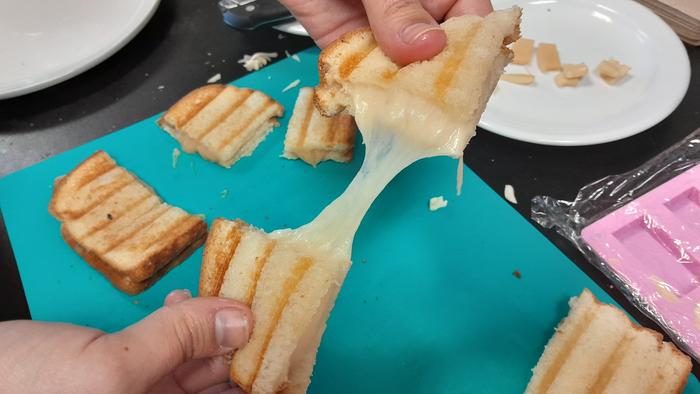
In a groundbreaking study published in Physics of Fluids, researchers from the University of Guelph in Ontario and the Canadian Light Source Inc. in Saskatchewan present new advancements in the development of plant-based cheese alternatives. This research aims to create products that closely mimic the creamy and indulgent characteristics of traditional dairy cheese while enhancing nutritional benefits, a challenge that has historically plagued the plant-based food industry.
The appeal of plant-based dairy products has surged in recent years, driven by increasing consumer interest in healthier lifestyles and animal welfare. However, achieving a cheese-like texture, mouthfeel, and flavor profile remains a significant hurdle for manufacturers. Alejandro Marangoni, a leading author of the study, articulates the sentiment of many consumers: “Now, consumers expect essentially the same animal product but with plant-based ingredients, which is very difficult.” This study hopes to bridge the gap between expectation and reality by exploring how various plant proteins can interact with alternative cheese formulations.
The research meticulously investigates several types of plant-based proteins, examining their interactions with different fats and scaffolding matrices used in cheese alternatives. The team emphasizes the importance of understanding the melting points, stretching qualities, and oil release characteristics of plant-based cheeses, similar to those attributes well-documented in dairy products. The findings shed light on the functionality of these plant proteins, which is critical for replicating the desirable textures and flavors associated with traditional cheeses.
Previous studies have indicated that a specific blend of fats can achieve a desirable cheese texture. In prior research, scientists discovered that a combination of 25% coconut oil and 75% sunflower oil, complemented by pea protein, resulted in a texture reminiscent of dairy cheese. Building on this foundation, Marangoni and his team explored isolates from three distinct plant protein sources: lentil, faba bean, and a unique variety of pea protein. Their goal was to understand not only how these proteins behave on their own but also how they interact with fats and starch matrices in creating cheese-like textures.
Through their observations, the researchers noted that increasing the coconut oil content leads to a firmer cheese consistency. However, they found that a formulation featuring pea protein and a 25% coconut oil content yielded the firmest texture, attributed to unique protein-fat interactions. This blend surpassed previous formulations in terms of melting properties, oil retention, and stretchability, indicating a promising direction for future plant-based cheese development.
As the team delves deeper into the mechanics of these protein interactions, they highlight the challenges inherent in replicating the structural integrity and functional properties of milk proteins. Marangoni points out that while the behavior of dairy proteins is reasonably well understood, the functionality of plant proteins is far less documented. The wide array of plant proteins, each with unique characteristics, adds complexity to the development process, making it crucial for researchers to isolate and experiment with different protein sources effectively.
In their quest to enhance the nutritional profile of plant-based cheeses, the researchers emphasize the importance of reducing saturated fat content. By utilizing a blend of coconut and sunflower oils, they not only achieve desirable textural properties but also create a healthier alternative to traditional cheeses, which are often criticized for high saturated fat levels. This focus on nutrition and sustainability aligns with the growing consumer demand for plant-based products that support better health outcomes and environmental responsibility.
Marangoni outlines the ultimate goal of this groundbreaking research: “Ultimately, we want to improve the nutrition, increase the protein content, and lower the saturated fat content of cheese alternatives.” He acknowledges the challenges ahead but remains optimistic that continued research will lead to solutions that satisfy both sensory and health-related consumer expectations.
This study is particularly pertinent within the current food landscape, where plant-based diets are becoming increasingly mainstream. As more consumers seek alternatives to dairy and meat products, the need for innovative solutions such as plant-based cheeses becomes alive with possibilities. The nuances of texture and flavor in these alternatives can significantly impact consumer acceptance and willingness to incorporate these products into their diets.
As fermentation and innovation in food science continue to blur the lines between plant-based and dairy products, this research serves as a stepping stone towards a future where plant-based cheeses can hold their own against traditional dairy offerings. The continued exploration of protein interactions and fat dynamics will undoubtedly play a pivotal role in this evolution, ensuring that plant-based cheeses are not just alternatives but viable options for a wider segment of the population.
The study titled “Impact of protein sources on the functionality of plant-based cheeses formulated with saturated and unsaturated fat,” authored by Marangoni and his colleagues, exemplifies a forward-thinking approach to food science. Set to be published on January 14, 2025, the findings represent a significant contribution to the field of food technology, particularly in developing plant-based food alternatives.
As the trend towards plant-based diets continues to grow, research like this is essential to satisfy a market hungry for new innovations. With a focus on health, nutrition, and sustainability, the researchers at the University of Guelph are not just aiming to replicate cheese; they are creating a new paradigm for food that meets modern dietary needs. The future of cheese might just be plant-based, thanks to the dedication of scientists championing this change.
As this research garners attention, it could pave the way for further studies exploring the full spectrum of plant proteins and fats, ultimately leading to a new generation of products that rival traditional dairy items in flavor, texture, and health benefits.
Subject of Research: Plant-based cheese alternatives
Article Title: Impact of protein sources on the functionality of plant-based cheeses formulated with saturated and unsaturated fat
News Publication Date: January 14, 2025
Web References: Physics of Fluids
References: DOI: 10.1063/5.0238556
Image Credits: Credit: Alejandro Marangoni
Keywords: Plant-based cheese, nutritional science, food technology, protein functionality, dairy alternatives, sustainable food, culinary innovation.





